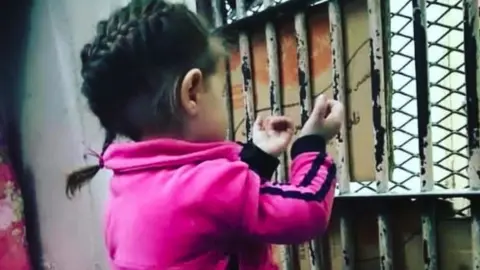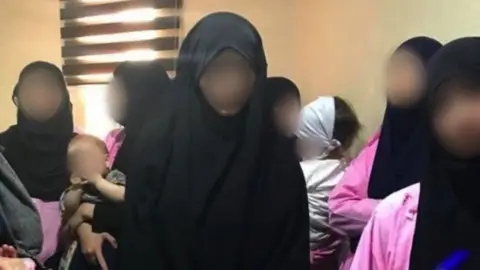Islamic State: Hundreds of women on hunger strike at Iraqi prison
 BBC
BBCAt least 400 women are in the second week of a hunger strike in a high-security prison in Iraq's capital Baghdad, the BBC has learned.
They are in prison for being part of the Islamic State group, after what they say were unfair trials.
The group is said to include foreign nationals from Russia, Turkey, Azerbaijan, Ukraine, Syria, France, Germany and the US.
It is thought about 100 children are also being held at the facility.
The Islamic State group, also known as ISIS, waged a brutal campaign to establish a self-declared caliphate - an Islamic nation - across Syria and Iraq, killing and enslaving thousands across a five-year period.
After its fall in 2017, tens of thousands of former members were rounded up. It is alleged many of the men were summarily executed, but thousands of women and children were taken into detention. Some were repatriated to their home nations, but many remain in Syrian and Iraqi jails.
Videos sent to BBC Arabic from inside the Baghdad facility show emaciated women lying motionless on hard stone floors. It is thought the group have not eaten since 24 April.
The BBC has been told that at the start of the hunger strike, participants were consuming just half a glass of water per day. Some women have now stopped drinking altogether.
Young children can also be seen in the video footage - many reportedly born inside the facility.

The women's sentences range from 15 years to life imprisonment. Some have been sentenced to death, but no executions have been carried out, the BBC understands.
The hunger strike is a protest against both their convictions and the conditions they are being held in.
Speaking on an illegally-held mobile phone, one Russian woman said she would not eat anything until she was released. She said she was given a 15-year sentence after a 10-minute trial, based on a confession she was forced to sign.
The document was written in Arabic, a language she cannot read, and stated she was arrested in Mosul whilst carrying weapons, both of which she denies.
It has not been possible to verify most of her claims.
The women said they had had no contact with their embassies, and diplomatic representatives had not been present at many of their trials.

The women we spoke to claimed around 60 adult inmates had died inside Rusafa prison over the last six years, along with up to 30 children. One woman said the last child to die was three years old.
The facility is located east of Baghdad, and holds women serving sentences for various crimes - not all terror-related. The inmates said they were held 40 to a cell, and were often subjected to beatings and inhumane treatment.
Last April, the Iraqi ministry of justice announced the dismissal of the director of the prison, citing "leaked audio" from the facility. The ministry also acknowledged that Rusafa prison was four times over its capacity.
Iraq's criminal justice system has long been criticised over allegations that trials are unfair and abuse is widespread.
The Iraqi government declined to answer the BBC's questions about the hunger strike or conditions in the prison. Previously, it has said it wants to help those who are innocent of any crime to return to their home countries.
Amnesty International, however, has reported that long prison terms and death sentences have been imposed in IS-linked cases "following convictions based primarily on torture-tainted 'confessions'".
The Human Rights Committee of the Iraqi parliament recently urged the authorities to speed up the process of repatriation of IS-linked foreign prisoners.
While some women have admitted to willingly joining IS, often participating in their crimes, others claim they were tricked or coerced into joining the group. Some insist they were forced to marry fighters and were threatened with death if they refused.
One of the most high-profile is Shamima Begum, a British schoolgirl who travelled to Syria in 2015. She is still being held in a detention camp in the north of the country.
Additional reporting by Joe Inwood and Peter Ball.
